
Built on the expertise and experiences of urban agriculturalists, along with research from the University of Michigan, a new policy brief urges Congress to fully fund the Office of Urban Agriculture.

Though there is broad consensus in academic circles around climate science and the potential effects of the looming climate crisis, people carry different ideas around sustainability—often informed by their own political viewpoints. Across schools and disciplines, University of Michigan experts are examining the interplay between current political discourse, the regulatory framework, and various communities affected, and identifying common touch points facing different stakeholders.

Built on the expertise and experiences of urban agriculturalists, along with research from the University of Michigan, a new policy brief urges Congress to fully fund the Office of Urban Agriculture.
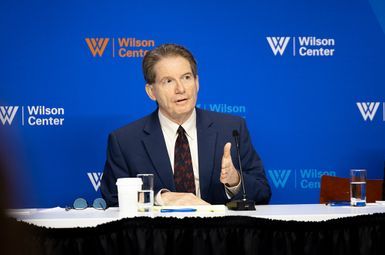
Despite ongoing geopolitical tensions, the United States and China have the opportunity to collaborate on reducing methane emissions, a critical greenhouse gas significantly contributing to about 30 percent of global warming.
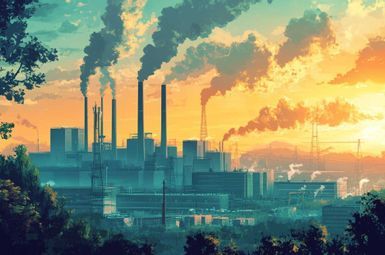
For carbon capture and utilization (CCU), public support depends on which aspect of the technology is being considered and which people are considering it, according to a new study conducted by researchers from University of Michigan and other institutions.
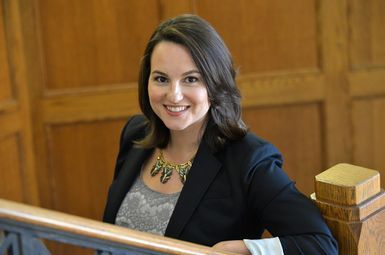
As climate-induced migration increases in the U.S. and elsewhere around the world, what are the potential policies to help communities adapt and support residents? In a new Core Conversations podcast, Kaitlin Raimi explores how Americans view climate migrants, how policies could become a crucial factor influencing climate migration, and what the broader impacts of migration may mean for American society and the economy.

People find it hard to resist negative messages. A recent U-M study reveals that recipients are more likely to engage with emails containing negative sentiment sent by the Environmental Defense Fund, a U.S. based nonprofit organization. Specifically, emails with a negative tone were more frequently opened, and recipients were more likely to click on links within these emails, compared to those with a positive tone.
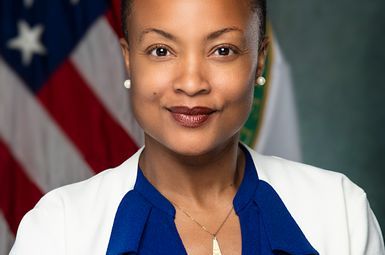
Currently the director of the Office of Energy Justice and Equity and the secretarial adviser on equity at the U.S. Department of Energy, and formerly the department’s chief diversity officer, Baker will advance sustainability education and research across U-M schools and colleges.
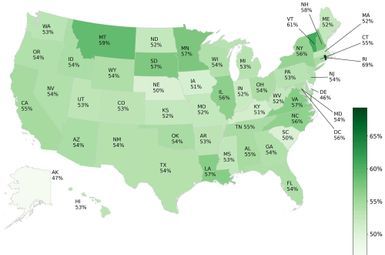
Identifying public concerns and misconceptions about nuclear energy can target efforts to bridge these gaps as nuclear energy will play a large role in goals to decarbonize by 2050, replacing oil and gas as a stable baseload electricity source.

According to a U-M survey, 86% of respondents either strongly or somewhat support adding rooftop solar panels. The survey found some regional variation: Rooftop solar drew support from 83% of leaders in the Upper Peninsula, while garnering 89% support from southeastern Michigan officials.
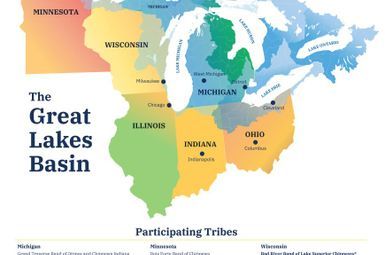
“Given that we sit in the heart of the Great Lakes and 21% of the world’s fresh surface water, we wanted to explore the region’s plans to identify the highest-impact, most innovative and scalable multi-state opportunities. We looked for what was working, to inform ways to accelerate community-based climate action."
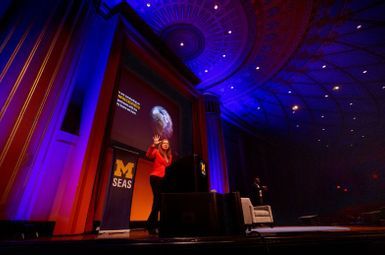
One of the most important things people can do to address climate change is talk about it, climate scientist Katharine Hayhoe said. Citing statistics that two-thirds of people in the United States are worried about climate change, but only 8% are activated to do something about it, Hayhoe said talking about climate change doesn’t mean trying to change the minds of those who believe it is a hoax.
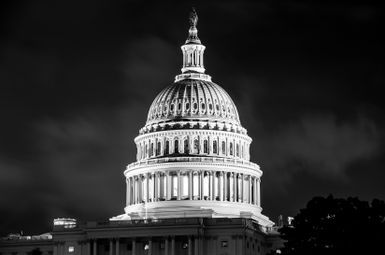
“I think we’ve become more and more aware of that as a problem, and it’s tearing down Americans’ trust of their own country and their government, because they feel like the game is rigged. And if we want to try to restore some trust in the system, we need to unrig it."
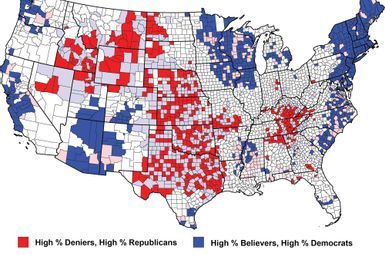
Scientists have long warned that a warming climate will cause communities around the globe to face increasing risks due to unprecedented levels of flooding, wildfires, heat stress, sea-level rise and more. Though the science is sound—even showing that human-induced, climate-related natural disasters are growing in frequency and intensity sooner than originally anticipated—climate change is still not wholly accepted as true in the United States.

The United States recently passed major climate change laws, such as the Infrastructure Investment and Jobs Act (IIJA), the Inflation Reduction Act of 2022 (IRA), and the CHIPS and Science Act, which allocate funding with a goal of expanding energy-transition initiatives. Analysts suggest new investments could reduce greenhouse gas emissions by more than 40% below 2005 levels by 2030.
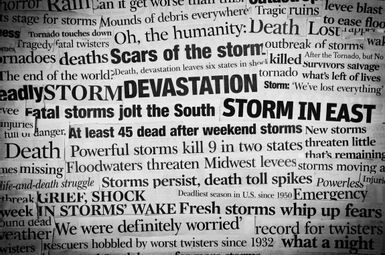
Concern for climate change grows—along with support for policies to reduce emissions—when people read about Americans being forced to move within the U.S. because of it. That’s in sharp contrast to learning about climate-induced moves to the U.S. by non-Americans, which doesn’t move the dial on climate change beliefs or policy support.
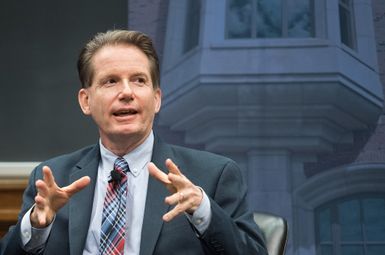
At the COP28 climate summit in Dubai, nearly 200 nations approved a global pact that calls for transitioning away from fossil fuels—a first. The deal also calls for tripling the use of renewable energy, doubling energy efficiency and slashing methane emissions.
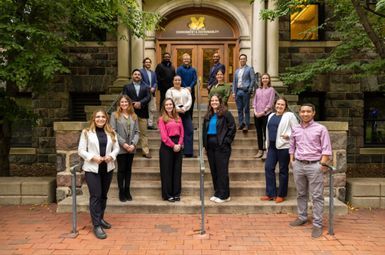
Sixteen U-M students and their faculty adviser will attend the two-week COP28 climate summit in Dubai, United Arab Emirates. The students will observe the negotiations, attend side events and interact with various experts. This year’s conference runs from Nov. 30 to Dec. 12. U-M has sent student delegations to U.N. climate change conferences since 2009.
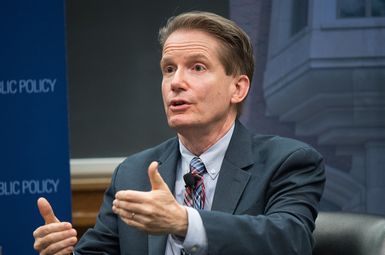
"The possibility of a sudden shift [of policy] would be pretty shocking for the industry to absorb. (...) I can’t imagine the industry is going to want to be jerked back and forth every four or eight years.”
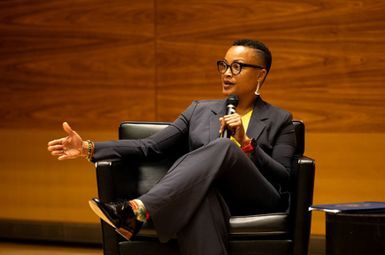
We are in an “extraordinary moment” to create an equitable clean energy future. And Michigan, like other states, is an “essential part” of bringing forth that future.
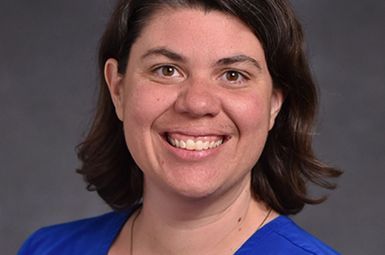
"Michigan’s legislative leadership earlier this year announced its intention to introduce a package of bills to accelerate the Mi Healthy Climate Plan. Recently, Governor Whitmer put her support behind the proposal and echoed what those involved in the renewable energy transition have noted for some time: the current approach to permitting clean energy projects is broken."
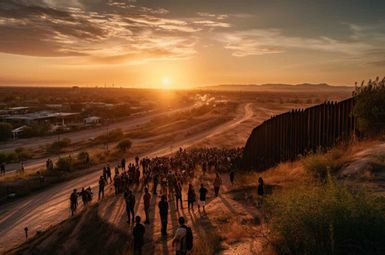
Reading about climate-induced immigration prompted negative, nativist attitudes among people toward the affected migrants—an unintended, perhaps even paradoxical effect of many delivering the original messages, according to researchers at U-M and elsewhere. The findings, the researchers say, raise cautionary flags for reporters, advocates and other communicators in their work related to forced migration caused by global climate change.
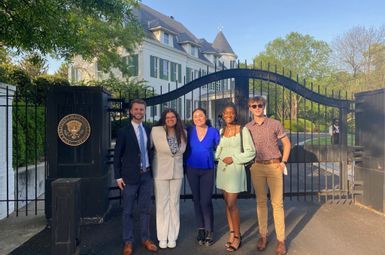
"This is really important work, especially in the face of all the [negativity] that goes on in the world. I want to be able to go to bed at the end of each day with the satisfaction of knowing that I am contributing to the world in a positive way.”
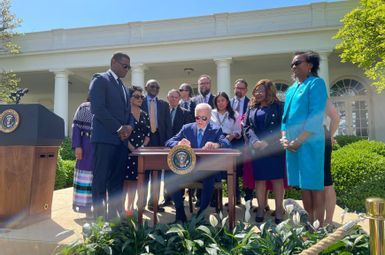
President Biden signed a historic executive order called Revitalizing Our Nation’s Commitment to Environmental Justice for All, which will direct federal agencies to focus on confronting longstanding environmental injustices. Kyle Whyte, the George Willis Pack Professor at the U-M School for Environment and Sustainability (SEAS), a U.S. Science Envoy, and a member of the White House Environmental Justice Advisory Council, served as an advisor on the development of the executive order.
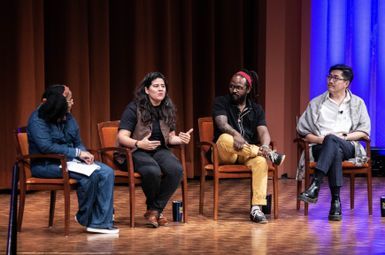
Participating in our democracy, particularly locally, and organizing for systems and policy change to promote the collective good is critical to building a clean energy future that is just and works for all. This was the overall sentiment of a panel that brought together three community activists and organizers who have emerged as powerful leaders that work on pushing forward solutions that consider the rights of all people.
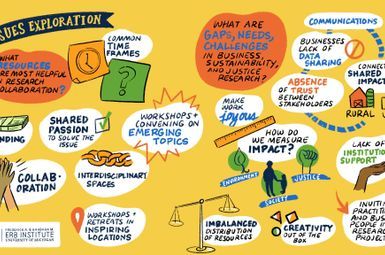
Instances of injustice lie everywhere—from workers’ rights violations to pollution that disproportionately harms low-income communities of color. The Erb Institute recently convened the workshop “Building Connections for Business, Sustainability & Justice Research,” bringing together scholars, corporate leaders and advocates to explore how research can inform solutions to pressing environmental, social and racial justice challenges.

With more than half of the world’s population active on social media networks, user-generated data has proved to be fertile ground for social scientists who study attitudes about the environment and sustainability. But several challenges threaten the success of what’s known as social media data science.
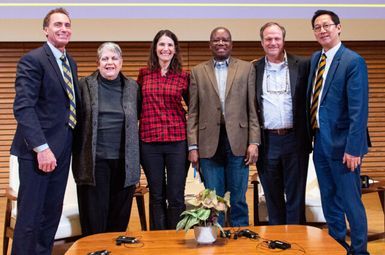
Janet Napolitano, former UC president, U.S. secretary of homeland security and Arizona governor, joined U-M sustainability experts for a panel discussion on climate action. The discussion, entitled “Working Together to Tackle the Climate Crisis,” centered around mobilizing government, higher education, the private sector, community stakeholders and individuals toward addressing the climate crisis.
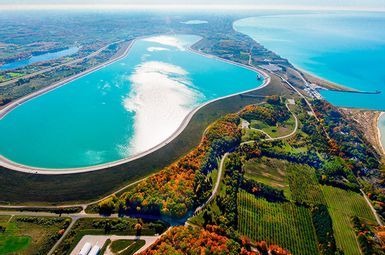
The Graham Sustainability Institute’s Carbon Neutrality Acceleration Program (CNAP) announced $1,160,000 in funding for six new faculty research projects. They tackle a range of carbon neutrality topics and augment the CNAP portfolio, which addresses six critical technological and social decarbonization opportunities: energy storage; capturing, converting, and storing carbon; changing public opinion and behavior; ensuring an equitable and inclusive transition; material and process innovation; and transportation and alternative fuels.

Climate change deniers are using new strategies to spread their beliefs — namely the conspiracy theory that climate change is a hoax meant to subdue populations.
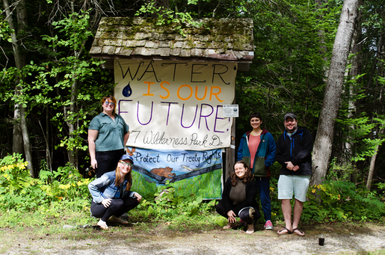
In the video, tribal leaders and Native community members share the ways that Line 5 harms Native communities and how a future with clean energy is possible and essential.
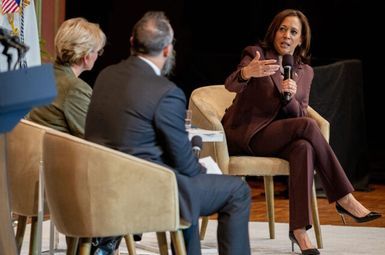
“I think that we are at one of the most incredible moments in this movement — a movement that, yes, we are a big part of, but that you all will be leading for years to come, and I’m so excited."
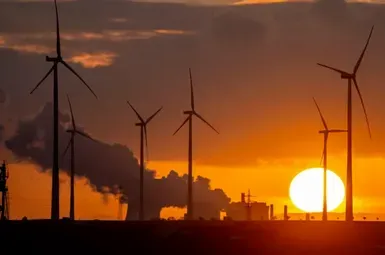
"From my vantage point at a large public university, I know firsthand how activism and energy of students, with support from faculty and other university communities, has galvanized our institution to make real commitments and progress toward carbon neutrality."
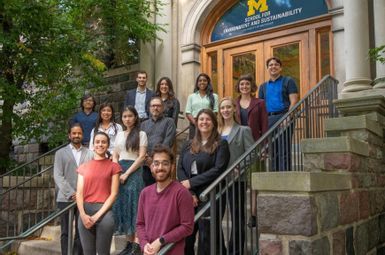
Since returning from COP27, the United Nations climate change conference, University of Michigan student delegates have been reflecting on their experiences. At the conclusion of COP, the Conference of the Parties agreed to establish loss and damage funding for vulnerable communities and recommitted to keeping the 1.5°C target goal alive through a new mitigation work program.

Global climate talks in Egypt are heading into the home stretch with many issues still unresolved. Negotiators from nearly 200 countries have gathered in Sharm el-Sheikh for the COP27 conference in an effort to curb greenhouse gas emissions and avoid the worst ravages of climate change.

People who respond less emotionally to images of damage to the environment are also less emotional and empathic in general, according to a new U-M study. Differences in political ideology can limit policy adjustments that address climate change. However, some people appear less emotionally impacted by environmental destruction—particularly those who are more ideologically conservative and less pro-environmental, the study showed.

"One major component of the legislation addresses methane, a major climate pollutant that has tended to get less attention than carbon dioxide until recently. The new statute established a fee on methane releases from the oil and gas sector, designed to complement other regulatory policies that are being developed by the U.S. Environmental Protection Agency. With this step, the U.S. would join Norway as only the second major national producer of oil and gas to establish a tax or fee on methane emissions in an attempt to incentivize less waste."

"Europe has been the global leader on climate policy for at least the last 10 years. They have done the most in making their own adjustments. They’ve tried to find ways to put pressure on the U.S., the rest of the world and move this forward. And despite all of these efforts — and some real emission reductions in Europe — they aren’t able to hide from the effects of this either."
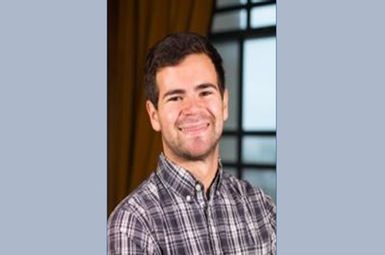
Ford School PhD graduate Michael Lerner (Political Science, 2021) has been chosen to receive the Virginia Walsh Dissertation Award for his dissertation, "Green Catalysts? The Impact of Transnational Advocacy on Environmental Policy Leadership.“ The dissertation examines the impact of transnational advocacy on the development of national environmental policy.
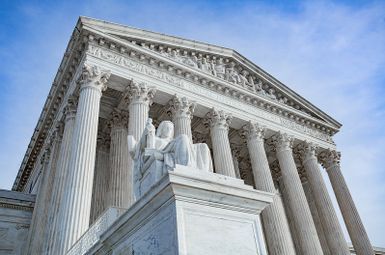
"The ability of presidents to reinterpret established laws to address emerging challenges such as climate change is further eroded by today's Supreme Court decision. The majority concludes the Obama administration exceeded its authority in using the Clean Air Act to try to address climate, putting tight limits on the ability of President Biden or subsequent presidents to use these powers on climate issues."

On the campaign trail, President Biden promised climate action. But, a few bumps in the road have delayed that action. Specifically, the Build Back Better bill, which includes provisions for action on climate policy, has been stalled. Barry Rabe, J. Ira and Nicki Harris Family Professor of Public Policy, explained what the bill could achieve if passed.
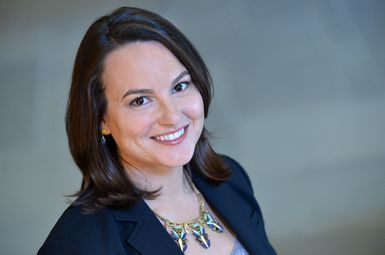
"Critics [who prefer traditional climate policies] fear that adopting simpler behavioral interventions may divert attention from and even crowd out public support for climate policies."
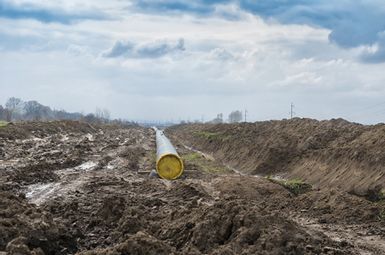
"Instead of supporting knee-jerk policy shifts to produce more fossil fuels, we need to take a deep breath and examine how we got into this energy jam. Throughout the history of the fossil fuel era, wars have been fought over access to oil and gas, and fossil fuels have been used for political advantage both within petro-states and internationally for strategic goals."

When the attendees of COP26 met in Glasgow last November to address climate change, they were a long way from rain gardens in Washtenaw County. Yet, the link between that global assembly and a southeastern Michigan water initiative illustrates different approaches in pursuit of the same goal: how to connect science and policy in order to improve our environment.
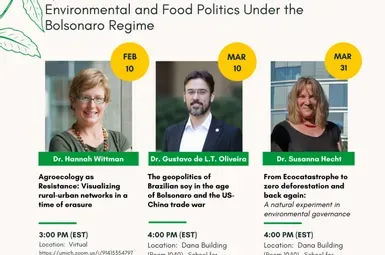
When Jair Bolsonaro, a right-wing populist, was elected as Brazil’s president in 2018, people began wondering about the consequences of that election for the environment, food systems, and trade, among many other social and ecological issues.
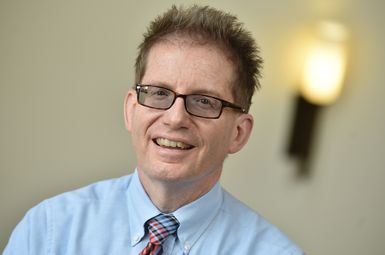
"One of the biggest surprises about the 117th Congress is, in an era where the conventional thinking is that carbon pricing is politically impossible, at least in the United States, how well some of the pricing policies have done.”

In the new Netflix movie “Don’t Look Up,” two astronomers discover a comet on a collision course with Earth and struggle to convince people to take them seriously. The film is a satire about society’s inability to cope with climate change. Several real-world scientists from U-M comment on the movie’s climate-change messages.